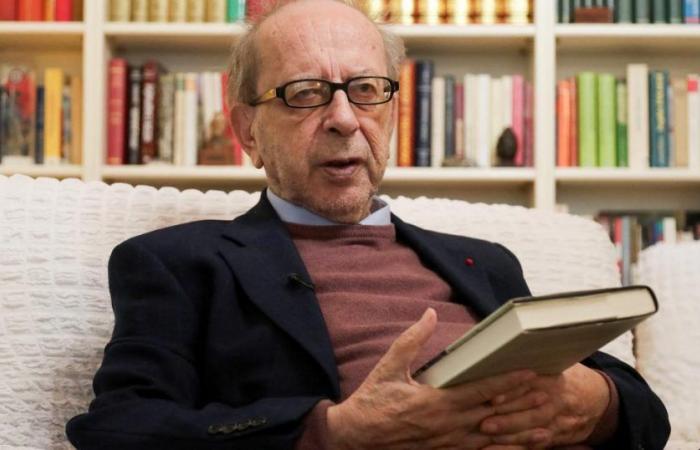A political refugee in France in 1990, the novelist left a body of work with a powerful epic breath, mixing sharp political analysis with legends of yesterday. He died Monday morning of a heart attack in the hospital of Tirana.
“If you trust literature, literature alone, it will be your heavenly protection. Nothing can happen to you”. Until 1990, the year he requested political asylum in France, Ismail Kadaré managed to make this motto his own, using the metaphor liberally in his many books that were very critical of totalitarian regimes, while his own country, Albania, was under the rule of a dictator.
Ismaïl Kadaré died Monday morning at the age of 88 from a heart attack, Tirana hospital said. He arrived there “without signs of life”, the doctors gave him a cardiac massage, but he “died around 6:40 a.m.” (8:40 a.m. local), the hospital said. For a long time, the writer embodied the paradox of being a writer who was both recognized and persecuted. If his books were published in Albania, they were often immediately banned by the regime or at best mutilated. He still rejoiced at this fact, arguing that these works were all the more valuable for his compatriots who hastened to obtain them.
Winner of several prestigious prizes including the Man Booker International Prize (2005) and the Prince of Asturias Prize (2009), the author was also regularly considered to receive the Nobel Prize for Literature. In France, since 1996, he had been an associate member of the Academy of Moral and Political Sciences, promoted to Commander of the Legion of Honor in 2015. He was in fact the best-known Albanian writer in the world, having contributed letters to to talk about this small country stifled for almost half a century by the dictator Enver Hodja.
Ismail Kadare was born in 1936 in Gjirokaster, the pearl of southern Albania, which was also the birthplace of the dictator a few years earlier. His father was a postman and the young boy showed an early interest in Greek tragedies and Shakespeare in particular. As a child and then as an adolescent, he experienced all the avatars of communism, first in the Russian fashion, then in the Chinese and finally in the Albanian fashion when his country fell out successively with the two great tutelary powers. At seventeen, the student at the University of Tirana was noticed for his verses. He was sent to the Gorky Institute in Moscow, a breeding ground for authors and critics. He enjoyed himself there as a student but would later declare that he had been unhappy as a writer. In fact, his first collection of poems was published by a Russian publisher, its texts untouched but accompanied by a preface that denounced the harmful influence of the West. Young Kadaré accepted this publication. There, the duality that marked him for many years took root. He was harshly criticized but tolerated by a regime that saw him as a foil to be sent to the West from time to time. For a long time, he put up with this state of affairs until the day he could no longer bear the compromises and stayed in Paris with his wife and two daughters.
In the meantime, in 1960, the young student returned home to Albania. “ If you can, through literature, not take the diet seriously, you are saved.” he declared to the New Observer in 2005. In fact from the start, he endeavored to undermine that of Albania. After Drinking Daysthe story of two little thugs indifferent to the socialist cause, a work immediately considered decadent, he published in 1963 what is considered his first novel. The General of the Dead Army enjoys great success in his country. We follow the unsuccessful attempts of an Italian officer who came to Albania to recover the bodies of soldiers who died a few years earlier. In place of his compatriots, who were nowhere to be found, he will bring back the remains of German soldiers! The West discovers through this book, translated seven years after its publication in Albania, that the small, muzzled Balkan country is home to a real writer with things to say.
Under the communist tyranny of Enver Hoxha
The novelist would continue to decipher the human and metaphysical dimension in novels on the fringes of the tale, in passing flaying the paranoid delusions of some. In The Palace of Dreams (1982), he depicts a country subject to dictatorship whose inhabitants must obligatorily summarize their dreams which are immediately meticulously listed. In La Pyramide (1992), he tells the story of the misfortunes of a pharaoh who tries to rebel against ancestral traditions by refusing to have a grandiose tomb built for himself. He will eventually give in and the construction will drag on as crises and revolts occur. At the same time, he runs the literary review, Albanian Letterspublished simultaneously in Albanian and French, this language being the only one officially taught in his country. He becomes a member of the establishment.
Unilaterally appointed as a deputy of the People’s Assembly, he enjoyed certain advantages over the rest of the population: a private car, the right to receive part of his royalties from his translations abroad, and a rather large apartment. He continued to publish books at a steady pace, but the shell of the writer who had taken refuge in literature gradually cracked. In 1982, he was subjected to a smear campaign. The ultimate irony: the dictator took up his cause. The break came in 1990, five years after the death of Enver Hodja. Ramiz Alia, the man who succeeded him, did not live up to the hopes of Kadaré, who had believed he saw in him the man of change and reform. While he was promoting the Palace of Dreams in France, the writer resolves to ask for political asylum. He writes “in such a duel between a tyrant and a poet, it is always, as we know, the poet who wins, even if, for a time, he may seem defeated”.
When the regime finally fell, he returned to the land of eagles, returning several times a year even though his home remained in Paris. In France, he continued to publish with the same regularity, faithful to Fayard, the publishing house of his original publisher Claude Durand (1938-2015). It was also in France that he undertook the herculean task of revising his entire work, pruning or completing works that he had self-censored. When the dictatorship fell, his new novels became lighter and shorter. Micro-novels replaced the sagas, but criticism was no longer necessarily hidden in symbolic form and Albania was still at the heart of his writings. At the end of the 1990s, he became involved in the cause of the Albanians in Kosovo. Virulently opposed to Serbia, he gave numerous interviews and public speeches.
Calm will then return, lulled by the regularity of the publications. After The Doll in 2015 in which he evokes the figure of his mother, he published in 2017 what is perhaps his most intimate story. Mornings at Café Rostandnamed after his Parisian headquarters, is presented as a collection of composite texts written during the previous decade lived between France and Albania, with which he had finally made peace. His latest novel, published in 2022, Disputes at the topemblematic of his entire work, reconstructs the telephone conversation between Stalin and Pasternak during the arrest of the poet Mandelstam in the 1930s.
In 2020, the Bouquin collection (Robert Laffont) cleverly reissued two of his works, Twilight of the Steppe Gods and the diptychThe Time of Quarrels devoted in part to the dissensions between small Albania and its powerful communist neighbors, China and the USSR, during the Cold War. The French then discovered the original version of the text, which was redacted by the Albanian regime when it was released in 1973. This remains the best painting of the daily life of a dictatorship by the man who described himself as “a normal writer in a crazy country ».






